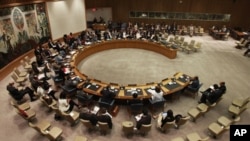Diplomats at the United Nations are discussing the latest version of a European-Arab plan to end the Syrian crisis.
The revised Security Council draft resolution "fully supports" an Arab League proposal for a political transition in Syria, but no longer includes an explicit call for President Bashar al-Assad to delegate his powers and form a unity government ahead of elections.
Several Western diplomats Thursday said they are hoping for a Council vote in the next few days. But others said there are no signs that Russia, a key Syrian ally, is satisfied. Moscow, a veto-wielding member of the Security Council, has promised to reject any text that hints at regime change or that does not explicitly rule out foreign military intervention.
Also Thursday, Russia's deputy defense minister, Anatoly Antonov said Moscow will keep selling arms to Syria despite mounting international condemnation of Mr. Assad's bloody crackdown on an 11-month opposition uprising. A clause in the U.N. draft resolution expressing "grave concern at the continued transfer of weapons into Syria" was stricken from the text.
Earlier in Hama, despite a heavy security clampdown, protesters splashed red paint symbolizing blood in the streets to commemorate Hafez al-Assad's February 1982 assault on the rebellious city. Amnesty International has estimated that between 10,000 and 25,000 people were killed in the siege, although conflicting figures exist and the Syrian government has never published an official toll.
The incident carried out by President Bashar al-Assad's late father is considered one of the most infamous massacres in the modern Middle East.
Residents said Hama was completely shut down Thursday, with schools and shops closed and employees staying home. Activists painted at least two streets red and threw red dye into the waters of Hama's famous and ancient water wheels. Internet footage showed graffiti that read, "Hafez died, and Hama didn't. Bashar will die, and Hama won't."
Hafez al-Assad was fighting a violent Islamist uprising in which the banned Muslim Brotherhood and its armed wing made a last stand in Hama against his iron-fisted rule. For many of Syria's Sunni Muslim majority, Hama is synonymous with an assault on their religion by the elder Assad, whose family belongs to the minority Shi'ite Alawite sect they deem heretical.
In contrast, the current unrest began with months of peaceful protests that have since given way to an armed uprising intent on ousting Mr. Assad from power.
The Syrian government accuses armed terrorists of driving the anti-Assad revolt and killing 2,000 security personnel. The United Nations estimated the death toll from the unrest at 5,400 last month, before it stopped updating the figure because of difficulties in obtaining information.
More than 300 people were killed nationwide during the past week alone. Much of the violence has occurred near Damascus as government troops drove the rebel Free Syrian Army out of the city's eastern suburbs during several days of heavy fighting.
Some information for this report was provided by AFP, AP and Reuters.
| Join the conversation on our social journalism site - Middle East Voices. Follow our Middle East reports on Twitter and discuss them on our Facebook page. |




